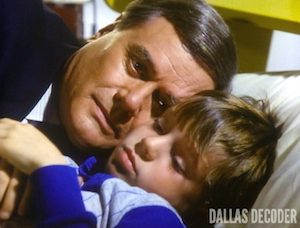
Slippery when wet
Planning to hit the road this summer? To have the happiest of holidays, let the Ewings be your guide.

Lurid rendezvous
Mix business with pleasure. Experts say you should unplug from work when you’re on vacation, but don’t tell that to J.R. Ewing. Did this man ever take a break? Not only did J.R. pursue multi-million-dollar oil deals during his various honeymoons with Sue Ellen and Cally, he also routinely brought secretaries like Julie and Kristin with him on his out-of-town “business trips.” Hey, don’t knock it. Who else was going to take J.R.’s dictation when he was on the road?

Squatters
Save money on lodging. Tempted to splurge on fancy hotels when you travel? Don’t be; the Ewings rarely did. Sue Ellen and her bratty kid shacked up with the Farlows during their sojourn in San Angelo. Likewise, when Kristin went to California, she crashed at Gary and Val’s Knots Landing pad. Sure, she was a houseguest from hell — is it that hard to put the cap back on the toothpaste tube, Kristin? — but at least she enlivened that dead-end cul-de-sac by breaking up a few marriages.

Hills alive
Remember: It’s a small world. Don’t be surprised if a familiar face or two shows up unexpectedly on your vacation. This happens to the Ewings all the time. Bobby and Pam ran into Gary at a convention in Las Vegas, Val encountered Gary and Abby during her book tour in Dallas, Ellie was surprised to spot Clayton during her visit to Galveston, and April popped in on Bobby during J.R. and Cally’s Austrian honeymoon. Hey, now that you mention it, what was Bobby doing there anyway?

Costume drama
When in Rome. … No matter where your travels take you, follow J.R.’s lead by blending in with the locals. For example, he got into the spirit of banana-republicanism by bribing officials in Cuba and Colombia. J.R. also played cowboy when he confronted B.D. Calhoun in Los Angeles, and he went all James Bond over Angelica Nero’s ass at the masquerade ball in Martinique. One wonders, though: When Angelica fired her gun, was she trying to shoot J.R. or the bird atop his head?

In plane sight
Get off the beaten path. Sure, you can vacation in an exotic locale, but if you want real relaxation, visit a medical facility. J.R. had a grand time when he checked himself into a mental ward, while Pam once hopped around the Caribbean, touring medical clinics. Pam also dragged Sue Ellen with her to a Hong Kong hospital, which Sue Ellen really liked — although probably not as much as the time she spent guzzling booze from a Scope bottle during her own sanitarium stay.

Long goodbye
Be flexible. No matter how much you plan, things aren’t always going to go your way while traveling. The trick is learning to roll with the punches. Did Jock and J.R. mope around after those hillbillies ambushed them in Louisiana? Hell no! They used the occasion for some father/son bonding. Likewise, did Bobby rush home after April was killed during their Parisian honeymoon? Of course not. He hung around an extra week. (Maybe he had more sightseeing to do?)

Revolutionary road
Don’t forget the souvenirs! No trip is complete without something to remember it by. Sue Ellen returned from the Orient with a bunch of toys for John Ross. Donna was sporting a fur coat when she and Ray returned from their honeymoon in New York City. John Ross came home from his honeymoon in Tulun with an ugly statue. Of course, when it comes to vacation mementos, no one tops Bobby, who returned from his New Orleans trip with the most notable souvenir in “Dallas” history — a wife!

Slim shady
Never travel with Clayton Farlow. If you heed no other advice here, please don’t ignore this one. Clayton may look and act like a kindly grandpa, but take it from us: This dude is shady. How many times did he whisk Miss Ellie away on some mysterious extended vacation? After one trip, she came home with a completely different face! The worst offense came in the next-to-last season, when Clayton took Mama away yet again … and never brought her back. Sure hope she packed well.
Where are your favorite Ewing road trips? Share your memories in the comments section below and read more Dallas Decoder Guides.































